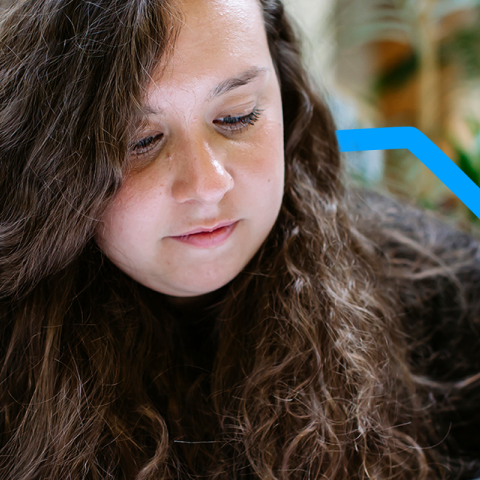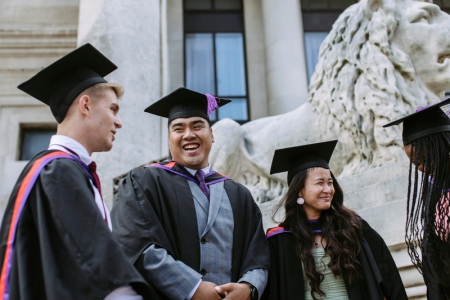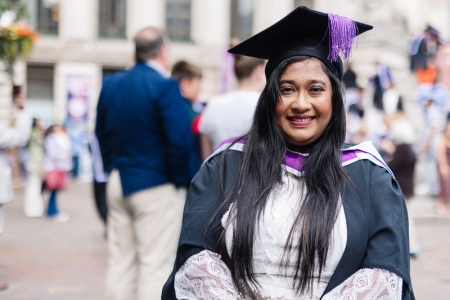
Showing content for section Overview
Overview
Develop your abilities as a teacher of English to speakers of other languages, or kickstart your TESOL career, on this flexible Master's in Applied Linguistics and TESOL.
You may already be an established TESOL practitioner (or ELT, EFL or EAP) with a minimum of three months full-time teaching experience, looking to advance your skills and become an expert in your field. If not, as long as you've completed initial ELT, TESOL or TEFL teacher training, you can still apply for this course and do an extra module to build up your practical teaching skills.
On this course, you'll apply contemporary TESOL theory to the classroom. Guided by our expert teaching team, you can apply your learning to the context of teaching you currently work in or aspire to, whether that's in the private or state sector, teaching adults, primary, secondary or higher education.
You'll use a global perspective to critique your own approaches to teaching, conduct your own research into teaching techniques, and explore lesson planning and course design.
You can study in a way that fits around your existing professional and personal commitments by choosing between full-time, part-time, campus-based or distance learning options.
When you graduate, you'll have a deeper understanding of TESOL and how best to get results as an expert practitioner. You'll be ready to pursue roles in areas such as educational management or leadership, curriculum development, editing, publishing or advertising, in the UK or overseas.
Prefer to study with a work placement?
You can also study for this Applied Linguistics and TESOL Master's (with Professional Experience).
Join our Postgraduate Open Events
From finding out which postgraduate option is right for you, to exploring the perfect course, browse our upcoming webinars and in-person events and book your place today.
Eligibility
This course accepts UK, EU, and International students.
Course highlights
- Take your TESOL knowledge and teaching skills to postgraduate level
- Choose to study in a way that suits you and your professional life, from on campus or distance learning, full-time (1 year) or part-time (2 or 3 years), and a September or January start
- Reflect on your classroom practice in order to improve the way you teach
- Learn to effectively plan and design a syllabus, courses and assessment methods, and choose to build a portfolio of lesson plans supported by critical reflection
- Analyse research into how people learn languages and the implications that has for the classroom
- Explore linguistic theory, unpick the hidden systems and bias in the use of language, and conduct research into teaching techniques
Why study MA Applied Linguistics and TESOL?
Whether you're already an experienced TESOL practitioner or want to embark on a new career, the MA Applied Linguistics and TESOL will develop your abilities as a teacher of English to speakers of other languages, and give you the opportunity to gain work experience too if you take the work placement pathway.
Discover what students enjoy about the course, and how we'll help set you up for success.
Zarir Bin Kalam: I saw that there was a vast opportunity in the teaching field where I can do some good to the community. I want to become a teacher. I want to do some good for the world.
Dr Quyen Tran: Our popular and distinctive MA in Applied Linguistics and TESOL is designed for both prospective and experienced teachers.
Dr Nick Bertenshaw: It's designed for those who’ve maybe done quite a bit of teaching before, and they want to learn more about the theory.
Marina Barantseva: Even if you're an experienced teacher and you're good at it, at some point you’ll realise that you need to integrate theory and practice.
Dr Nick Bertenshaw: We also look at the theory behind all this. So for example, there's a module on second language acquisition where we ask the teachers to reflect on their teaching, learning and how this actually relates to the theories.
We offer this course as both full-time and part-time. It's also available on campus and in a distance learning format so students can be anywhere in the world and take the course.
Jane Ugwu: For me, the staff have been very, very supportive in helping me to achieve my dreams.
Dr Quyen Tran: Many of our colleagues are internationally recognised authors and their vast subjects expertise really influences the topics covered in the course.
Trang Nguyen: My favourite topic on this course is Classroom of TESOL. It’s very practical.
Zarir Bin Kalam: I get to know about the world and the human culture a lot. I really love that about MA Applied Linguistics and TESOL.
Dr Quyen Tran: If students choose the pathway with the professional experience year, in the first year of their course, they will attend many placement preparation sessions. They will have the opportunities to work in public schools or private language institutions. They will receive plenty of support from our placement team.
Dr Nick Bertenshaw: Career opportunities for this course could be moving to a more senior role or some kind of promotion. Lots of our students are teachers beforehand. But aside from that, there's also opportunities for things like publishing. Students should study at Portsmouth because it's a really exciting city. We're right by the sea here.
Dr Quyen Tran: Everything that the students may need is within walking distance.
Dr Nick Bertenshaw: It's a really interesting, vibrant city.
Jane Ugwu: I decided to take on educational pursuits in Applied Linguistics and TESOL, and I've really been able to achieve a lot of things. So for me it’s a dream come true.
Contact information
Contact AdmissionsEntry requirements
Eligibility
This course accepts UK, EU, and International students.
September 2024 / January 2025 start
- A second-class honours degree or equivalent.
Please get in touch if you're not sure if your undergraduate subject is relevant to this degree.
Equivalent professional experience and/or qualifications will also be considered, such as previous study, employment, voluntary work and training courses, including courses and qualifications you didn't complete. Learn more about our Recognition of Prior Learning (RPL).
If you're applying as an international student with a non-UK degree, you’ll need to show you meet the UK entry requirements listed above.
To find out if your non-UK degree or other qualification is accepted, please visit our page for your country and view the UK equivalent of your qualification.
- Initial teacher training and a minimum of three months full-time, relevant, teaching experience.
- If you do not have relevant teaching experience, you can still apply for our campus programme, and you will study an additional non-credit bearing module The Classroom Practice of TESOL at no additional cost.
- English language proficiency at a minimum of IELTS band 6.5 (or equivalent) with no component score below 6.5.
You do not need an IELTS or equivalent certification if:
- you have a UK degree
- you have a degree from a majority English speaking country (not taught by Distance Learning)
- you are a national of a majority English speaking country
Degrees taught solely in English from non-majority English speaking countries will be considered on a case by case basis. Find out more about our English language requirements.
If you do not meet the English language requirements yet, you can achieve the level you need by successfully completing a pre-sessional English programme before you start your course.
Course costs and funding
Tuition fees (September 2024 / January 2025 start)
- Full-time: £10,400
- Part-time: £5,200 per year
- Full-time (distance learning): £10,400
- Part-time (distance learning - 2 years): £5,200 per year
- Part-time (distance learning - 3 years): £3,470 per year
(including Transition Scholarship)
- Full-time: £10,400
- Part-time: £5,200 per year
- Full-time (distance learning): £10,400
- Part-time (distance learning - 2 years): £5,200 per year
- Part-time (distance learning - 3 years): £3,470 per year
- Full-time: £17,900
- Part-time: £8,950 per year
- Full-time (distance learning): £10,400
- Part-time (distance learning - 2 years): £5,200 per year
- Part-time (distance learning - 3 years): £3,470 per year
University of Portsmouth graduates may receive a 20% alumni tuition fee discount.
Fees are subject to annual increase. Read our tuition fees terms and conditions.
You'll be able to pay your fees in instalments. Find out how to pay your tuition fees.
Funding your studies
Explore how to fund your studies, including available scholarships and bursaries.
If you're a UK student, you may be eligible for a Government Postgraduate Master's Loan, which you can use to help with course fees and living costs.
Loans, scholarships and bursaries
Browse funding such as the Government Postgraduate Loan, our scholarships for new and returning students, and subject specific loans.

Funding for international students
Learn more about sponsorships, scholarships and loans for students applying from outside of the UK.

Fees and funding for Master's courses
Explore Master's funding options, including loans, scholarships, bursaries and more.

Additional costs
These course-related costs aren't included in the tuition fees so you'll need to budget for them when you plan your spending. Additional costs could include:
- Accommodation: If you choose to study on-campus, accommodation options and costs can be found on our accommodation pages
- Recommended reading: You can borrow key texts from the library and if you choose to purchase these texts they may cost up to £60 each.
- General costs: such photocopying, memory sticks, printing charges, binding and specialist printing. We suggest budgeting £75 per year.
- Final project transport or accommodation: where necessary, which related to your research activities. The amount will depend on the project you choose.
Read more about tuition fees and living costs, including what your tuition fees cover.
Modules
Full-time (on campus)
Core modules
You’ll explore leading theories and models explaining successful language learning, considering how individual differences intersect with social, cultural and linguistic environments.
You’ll reflect on your own unique language journey to help you rethink teaching practices. Gain tools to evaluate multilingual language policies and program design grounded in evidence-based best practices for dual language, ELL and foreign language education contexts.
You'll consider both what we know about how people learn languages and the practical considerations determined by the context in which the classroom teaching happens.
You'll learn about planning activities, lessons and courses for a variety of situations, as well as strategies for motivating learners.
Optional modules
With academic guidance, you'll choose your own literature or empirical topic within a field of study that fits the parameters of your intended Master’s exit award.
You'll bring together everything you’ve learned to design and evaluate ethical methodologies, conduct systematic research, and communicate your ideas professionally in your dissertation or report.
Learn to critically examine how powerful sociocultural forces and ideologies subtly shape real-world communication.
You’ll look at written and spoken texts from multiple perspectives, and develop your sensitivity to how interpersonal relationships, social contexts and power dynamics influence linguistic choices in different areas.
Through critical analysis and reflection, you’ll discover how key psychological concepts and theories relate to real-world language learning and teaching environments, including your own contexts.
You’ll learn about factors such as teacher and learner beliefs, emotions and identities that influence language learning and teaching. You’ll then use these insights to address issues and challenges informed by psychological theory and research.
You’ll cover the history and geography of English in the world, variation across Englishes, English as an international lingua franca, translanguaging, the pedagogy of English as an international language, linguistic imperialism, language and ideology, language and identity, and language and de-colonisation.
You'll critically evaluate the relevance of a range of classroom procedures and techniques, with a specific focus on their application in the language classroom.
Through this process, you'll learn to adapt these methodologies, ensuring they are effectively aligned with learning objectives and student needs.
Additionally, you'll gain practical teaching experience through the micro-teaching sessions included in the module, which will enable you to reflect on and refine your teaching practices.
By building your language expertise, you'll gain critical evaluation skills and blend theoretical insights into practical knowledge.
With expert guidance, you’ll choose a topic aligning with your specialisation, experiences and goals, and critically analyse, discuss and evaluate it in depth.
You’ll use primary and/or secondary data and/or practice to reach your own defined objectives.
You’ll not only on develop technological skills, but also create and critically evaluate relevant teaching and learning materials, with opportunities for linguistic research.
By the end of the module, you’ll have built a set of transferable skills related to the technologies used, and developed your analytical skills through discussions about how corpus methodologies are applied.
Full-time (distance learning)
Core modules
With academic guidance, you'll choose your own literature or empirical topic within a field of study that fits the parameters of your intended Master’s exit award.
You'll bring together everything you’ve learned to design and evaluate ethical methodologies, conduct systematic research, and communicate your ideas professionally in your dissertation or report.
You’ll explore leading theories and models explaining successful language learning, considering how individual differences intersect with social, cultural and linguistic environments.
You’ll reflect on your own unique language journey to help you rethink teaching practices. Gain tools to evaluate multilingual language policies and program design grounded in evidence-based best practices for dual language, ELL and foreign language education contexts.
Optional modules
Learn to critically examine how powerful sociocultural forces and ideologies subtly shape real-world communication.
You’ll look at written and spoken texts from multiple perspectives, and develop your sensitivity to how interpersonal relationships, social contexts and power dynamics influence linguistic choices in different areas.
Through critical analysis and reflection, you’ll discover how key psychological concepts and theories relate to real-world language learning and teaching environments, including your own contexts.
You’ll learn about factors such as teacher and learner beliefs, emotions and identities that influence language learning and teaching. You’ll then use these insights to address issues and challenges informed by psychological theory and research.
You’ll cover the history and geography of English in the world, variation across Englishes, English as an international lingua franca, translanguaging, the pedagogy of English as an international language, linguistic imperialism, language and ideology, language and identity, and language and de-colonisation.
You’ll develop principled frameworks for evaluating and writing language learning materials, drawing on theories of second language acquisition.
Discover a range of approaches to materials analysis, evaluation and writing and learn how to select appropriate approaches according to the teaching context.
With expert guidance, you’ll choose a topic aligning with your specialisation, experiences and goals, and critically analyse, discuss and evaluate it in depth.
You’ll use primary and/or secondary data and/or practice to reach your own defined objectives.
You’ll not only on develop technological skills, but also create and critically evaluate relevant teaching and learning materials, with opportunities for linguistic research.
By the end of the module, you’ll have built a set of transferable skills related to the technologies used, and developed your analytical skills through discussions about how corpus methodologies are applied.
Part-time (2 years on campus)
Core modules
You’ll explore leading theories and models explaining successful language learning, considering how individual differences intersect with social, cultural and linguistic environments.
You’ll reflect on your own unique language journey to help you rethink teaching practices. Gain tools to evaluate multilingual language policies and program design grounded in evidence-based best practices for dual language, ELL and foreign language education contexts.
You'll consider both what we know about how people learn languages and the practical considerations determined by the context in which the classroom teaching happens.
You'll learn about planning activities, lessons and courses for a variety of situations, as well as strategies for motivating learners.
Core modules
With academic guidance, you'll choose your own literature or empirical topic within a field of study that fits the parameters of your intended Master’s exit award.
You'll bring together everything you’ve learned to design and evaluate ethical methodologies, conduct systematic research, and communicate your ideas professionally in your dissertation or report.
Optional modules
Learn to critically examine how powerful sociocultural forces and ideologies subtly shape real-world communication.
You’ll look at written and spoken texts from multiple perspectives, and develop your sensitivity to how interpersonal relationships, social contexts and power dynamics influence linguistic choices in different areas.
Through critical analysis and reflection, you’ll discover how key psychological concepts and theories relate to real-world language learning and teaching environments, including your own contexts.
You’ll learn about factors such as teacher and learner beliefs, emotions and identities that influence language learning and teaching. You’ll then use these insights to address issues and challenges informed by psychological theory and research.
You’ll cover the history and geography of English in the world, variation across Englishes, English as an international lingua franca, translanguaging, the pedagogy of English as an international language, linguistic imperialism, language and ideology, language and identity, and language and de-colonisation.
You'll critically evaluate the relevance of a range of classroom procedures and techniques, with a specific focus on their application in the language classroom.
Through this process, you'll learn to adapt these methodologies, ensuring they are effectively aligned with learning objectives and student needs.
Additionally, you'll gain practical teaching experience through the micro-teaching sessions included in the module, which will enable you to reflect on and refine your teaching practices.
By building your language expertise, you'll gain critical evaluation skills and blend theoretical insights into practical knowledge.
With expert guidance, you’ll choose a topic aligning with your specialisation, experiences and goals, and critically analyse, discuss and evaluate it in depth.
You’ll use primary and/or secondary data and/or practice to reach your own defined objectives.
You’ll not only on develop technological skills, but also create and critically evaluate relevant teaching and learning materials, with opportunities for linguistic research.
By the end of the module, you’ll have built a set of transferable skills related to the technologies used, and developed your analytical skills through discussions about how corpus methodologies are applied.
Part-time (2 years distance learning)
Core modules
You’ll explore leading theories and models explaining successful language learning, considering how individual differences intersect with social, cultural and linguistic environments.
You’ll reflect on your own unique language journey to help you rethink teaching practices. Gain tools to evaluate multilingual language policies and program design grounded in evidence-based best practices for dual language, ELL and foreign language education contexts.
With expert guidance, you’ll choose a topic aligning with your specialisation, experiences and goals, and critically analyse, discuss and evaluate it in depth.
You’ll use primary and/or secondary data and/or practice to reach your own defined objectives.
Core modules
With academic guidance, you'll choose your own literature or empirical topic within a field of study that fits the parameters of your intended Master’s exit award.
You'll bring together everything you’ve learned to design and evaluate ethical methodologies, conduct systematic research, and communicate your ideas professionally in your dissertation or report.
Optional modules
Learn to critically examine how powerful sociocultural forces and ideologies subtly shape real-world communication.
You’ll look at written and spoken texts from multiple perspectives, and develop your sensitivity to how interpersonal relationships, social contexts and power dynamics influence linguistic choices in different areas.
Through critical analysis and reflection, you’ll discover how key psychological concepts and theories relate to real-world language learning and teaching environments, including your own contexts.
You’ll learn about factors such as teacher and learner beliefs, emotions and identities that influence language learning and teaching. You’ll then use these insights to address issues and challenges informed by psychological theory and research.
You’ll cover the history and geography of English in the world, variation across Englishes, English as an international lingua franca, translanguaging, the pedagogy of English as an international language, linguistic imperialism, language and ideology, language and identity, and language and de-colonisation.
You’ll develop principled frameworks for evaluating and writing language learning materials, drawing on theories of second language acquisition.
Discover a range of approaches to materials analysis, evaluation and writing and learn how to select appropriate approaches according to the teaching context.
You’ll not only on develop technological skills, but also create and critically evaluate relevant teaching and learning materials, with opportunities for linguistic research.
By the end of the module, you’ll have built a set of transferable skills related to the technologies used, and developed your analytical skills through discussions about how corpus methodologies are applied.
Part-time (3 years - distance learning only)
Core modules
You’ll explore leading theories and models explaining successful language learning, considering how individual differences intersect with social, cultural and linguistic environments.
You’ll reflect on your own unique language journey to help you rethink teaching practices. Gain tools to evaluate multilingual language policies and program design grounded in evidence-based best practices for dual language, ELL and foreign language education contexts.
Optional modules
Learn to critically examine how powerful sociocultural forces and ideologies subtly shape real-world communication.
You’ll look at written and spoken texts from multiple perspectives, and develop your sensitivity to how interpersonal relationships, social contexts and power dynamics influence linguistic choices in different areas.
Through critical analysis and reflection, you’ll discover how key psychological concepts and theories relate to real-world language learning and teaching environments, including your own contexts.
You’ll learn about factors such as teacher and learner beliefs, emotions and identities that influence language learning and teaching. You’ll then use these insights to address issues and challenges informed by psychological theory and research.
You’ll cover the history and geography of English in the world, variation across Englishes, English as an international lingua franca, translanguaging, the pedagogy of English as an international language, linguistic imperialism, language and ideology, language and identity, and language and de-colonisation.
You’ll develop principled frameworks for evaluating and writing language learning materials, drawing on theories of second language acquisition.
Discover a range of approaches to materials analysis, evaluation and writing and learn how to select appropriate approaches according to the teaching context.
With expert guidance, you’ll choose a topic aligning with your specialisation, experiences and goals, and critically analyse, discuss and evaluate it in depth.
You’ll use primary and/or secondary data and/or practice to reach your own defined objectives.
You’ll not only on develop technological skills, but also create and critically evaluate relevant teaching and learning materials, with opportunities for linguistic research.
By the end of the module, you’ll have built a set of transferable skills related to the technologies used, and developed your analytical skills through discussions about how corpus methodologies are applied.
Core modules
With academic guidance, you'll choose your own literature or empirical topic within a field of study that fits the parameters of your intended Master’s exit award.
You'll bring together everything you’ve learned to design and evaluate ethical methodologies, conduct systematic research, and communicate your ideas professionally in your dissertation or report.
Changes to course content
We use the best and most current research and professional practice alongside feedback from our students to make sure course content is relevant to your future career or further studies.
Therefore, some course content may change over time to reflect changes in the discipline or industry. If a module doesn't run, we'll let you know as soon as possible and help you choose an alternative module.

Joining us as an international student
You'll feel at home in our international community and our diverse city. You'll be joining over 5,000 international students from more than 150 countries who are studying with us.
Learn more about international student life and how we can help you with visas, applications, arrival and settling in.
From the lecturers to the coursemates, everyone has been so informative and has helped me to learn a lot and grow as a professional and as an individual.
Facilities and specialist equipment
You'll have the option to use these facilities during your studies:

Digital Language Laboratories
Perfect your listening and comprehension skills in a rich, multi-media language learning environment. Find out how to integrate and manipulate video, sound, text and internet sources in different languages.

Global Café
You can meet students from all over the world at the Global Café on Wednesday afternoons. Learn about other's cultures and practise speaking in each other's languages while making new friends and getting to share your own culture.
How you'll spend your time
We recognise that you'll probably be juggling more demands when you do your Master's degree, as you may be working or you may have family responsibilities.
We'll give you as much indication here as we can of how much time you'll need to spend in on-campus or in online lectures and seminars and how many hours you can expect to spend in self-directed study, but please note that these indications are always subject to change.
Course structure
This Master's degree will take:
- 1 year (full-time study)
- 2 years (part-time study)
- 3 years (part-time study)
Full-time study
The full-time course lasts 1 year whether you study on campus or by distance learning.
If you study full-time, you can expect:
- Up to 4 hours of teaching time every week (lecture, seminar or workshop) for each module you study, held over no more than 3 consecutive days in a week wherever possible.
- 24–30 hours of independent study each week.
Part-time study
If you study part-time on campus, your course will be 2 years, while if you study part-time by distance learning, you can choose to complete the course over 2 or 3 years.
Studying part-time, you can expect:
- All core material available online at all times so you can create your own study schedule around work or other commitments.
- 12–15 hours of independent study each week.
Teaching
Master's study is deeper and more specialised than an undergraduate degree. This means you'll focus on something that really matters to you and your career as you work closely with academics committed to the subject.
You'll spend more time in independent study and research than you did for your undergraduate degree. If you choose campus based study, the majority of your teaching time will be in-person and face-to-face.
Teaching methods on this course include:
- seminars
- workshop sessions
- one-to-one and group tutorials
- academic skills development workshops
Assessment
You’ll be assessed through:
- written assessments
- dissertation
You’ll be able to test your skills and knowledge informally before you do assessments that count towards your final mark.
You can get feedback on all practice and formal assessments so you can improve in the future.

All the teachers and staff are so cooperative that it made my year so easy and lovely.
I love my course obviously and I love Portsmouth!
Term dates
September start
The Master's academic year runs from September to the following September. There are breaks at Christmas and Easter. Over the summer you'll be writing your project / dissertation.
January start
Courses that start in January have the same amount of teaching as September-start courses, but they normally run over a longer time period.
January-start courses normally run between 14–18 months, beginning in January and ending in the spring / summer of the following year. There are breaks at Christmas, Easter and in the summer. In the last few months you’ll be writing your project / dissertation.
Career development
Careers this Master’s prepares you for
As a TESOL practitioner with a postgraduate qualification, you'll be ready to teach English to speakers of other languages all around the world to the highest professional standard. There are now more people who learn English as a second language than there are native speakers (ThoughtCo), so your skills will be in high demand.
When you complete the course, you'll have the specialist knowledge to stand out to employers at institutions such as universities, language schools and private schools in the UK and overseas.
Graduates of this course have gone onto areas such as:
- teaching English as a second/foreign language
- teaching ESOL in the UK
- teaching other languages, applying skills learning on this course
- educational management and/or leadership
- teacher training
- materials writing
- curriculum development
- editing
- publishing
- advertising
Graduates of this course have gone onto roles such as:
- Director of Studies (DoS)
- Senior Teacher
- Senior Lecturer of English as a Foreign Language
Career outcomes shown are sourced from the latest available graduate outcome surveys. The data shows career outcomes at 15 months after graduation.
Career planning
During your course you'll have expert career support from your tutors and from our Careers and Employability Centre, which you can access for 5 years after you graduate.

You'll benefit from:
- Networking events
- 1-to-1 appointments
- CV and cover letter advice
- Interview preparation and practice
- Workshops to enhance your employability skills
- Recruitment events including the Student and Graduate Opportunities Fair
- Support starting your own business
Supporting you
Master's study is more focused on independent learning than undergraduate study, but you'll get lots of support via video and phone from teaching and support staff to enhance your learning experience and help you succeed. If you choose to study on-campus, you'll also get face-to-face support. You can build your personalised network of support from the following people and services:
Types of support
Your personal tutor helps you make the transition to independent study and gives you academic and personal support throughout your time at university.
As well as regular scheduled meetings with your personal tutor, they're also available at set times during the week if you want to chat with them about anything that can't wait until your next meeting.
You'll have help from a team of faculty learning support tutors. They can help you improve and develop your academic skills and support you in any area of your study.
They can help with:
- improving your academic writing (for example, essays, reports, dissertations)
- understanding and using assignment feedback
- managing your time and workload
- revision and exam techniques
As well as support from faculty staff and your personal tutor, you can use the University's Academic Skills Unit (ASK).
ASK provides one-to-one support in areas such as:
- academic writing
- note taking
- time management
- critical thinking
- presentation skills
- referencing
- working in groups
- revision, memory and exam techniques
Our online Learning Well mini-course will help you plan for managing the challenges of learning and student life, so you can fulfil your potential and have a great student experience.
You can get personal, emotional and mental health support from our Student Wellbeing Service, in person and online. This includes 1–2–1 support as well as courses and workshops that help you better manage stress, anxiety or depression.
If you require extra support because of a disability or additional learning need our specialist team can help you.
They'll help you to
- discuss and agree on reasonable adjustments
- liaise with other University services and facilities, such as the library
- access specialist study skills and strategies tutors, and assistive technology tutors, on a 1-to-1 basis or in groups
- liaise with external services
Library staff are available in person or by email, phone, or online chat to help you make the most of the University’s library resources. You can also request one-to-one appointments and get support from a librarian who specialises in your subject area.
The library is open 24 hours a day, every day, in term time.
If English isn't your first language, you can do one of our English language courses to improve your written and spoken English language skills before starting your degree. Once you're here, you can take part in our free In-Sessional English (ISE) programme to improve your English further.
How to apply
Unlike undergraduate applications, which go through UCAS, applications for this Master's course are made directly to us.
There's no deadline for applications to this course. We accept applications right up until the start dates in September and January, as long as there are places available. If you wait until your start month to apply, you may find that the course is full.
If you're applying to study on-campus as an international student, remember that you'll need to leave plenty of time to get your visa organised.
You can find more advice about applying in our postgraduate application checklist. International students and current students and recent graduates of the University of Portsmouth also have some different application options, which are detailed below.
Extra information for international students
If you're an international student, you can apply directly to us using the same application form as UK students.
You could also get an agent to help with your application. Check your country page for details of agents in your region. To find out what to include in your application, head to the how to apply page of our international students section.
If you don’t meet the English language requirements for this course yet, you can achieve the level you need by successfully completing a pre-sessional English programme before you start your course.
Ready to apply?
Start this course in September 2024
On-campus
Apply now (Full-time) – 1 year
Apply now (Part-time) – 2 years
Distance learning
Apply now (Full-time) – 1 year
Start this course in January 2025
On-campus
Apply now (Full-time) – 1 year
Apply now (Part-time) – 2 years
Distance learning
Apply now (Full-time) – 1 year
I'm a current Portsmouth student, or a recent Portsmouth graduate
If you're currently in your final year of study at Portsmouth, or you graduated since July 2023, you're eligible to make a fast track application. You'll have:
- a shorter application form to complete
- access to the 20% Alumni fee discount
- a guaranteed conditional offer, for most Master's courses
After you apply
Once we receive your application, we may ask you for further information. We will then either make you an offer or suggest alternatives if your application is unsuccessful.
You'll usually get a decision within 10 working days, so you shouldn't have to wait too long. Some courses have an interview stage – we'll let you know if you need to prepare for one.
Learn more about how we assess your application.
Admissions terms and conditions
When you accept an offer to study at the University of Portsmouth, you also agree to abide by our Student Contract (which includes the University's relevant policies, rules and regulations). You should read and consider these before you apply.


